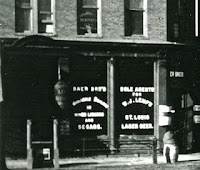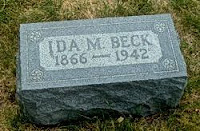 Today Aspen, Colorado, is world renowned as the playground of millionaires and intellectuals with a population exceeding 7,000. A Swedish immigrant who arrived there in 1892 to run a local liquor business, Henry Beck would be delighted. The town, located in a remote area of the Sawatch Range of the Rocky Mountains, had blossomed in the 1880s as a mining camp during the Colorado Silver Boom but in the 1890s entered a steep decline. Beck, hailed as one of the “progressive men of Western Colorado” was a stabilizing presence who helped rescue Aspen from becoming just another Colorado ghost town.
Today Aspen, Colorado, is world renowned as the playground of millionaires and intellectuals with a population exceeding 7,000. A Swedish immigrant who arrived there in 1892 to run a local liquor business, Henry Beck would be delighted. The town, located in a remote area of the Sawatch Range of the Rocky Mountains, had blossomed in the 1880s as a mining camp during the Colorado Silver Boom but in the 1890s entered a steep decline. Beck, hailed as one of the “progressive men of Western Colorado” was a stabilizing presence who helped rescue Aspen from becoming just another Colorado ghost town.
The son of Henry and Mary (Olson) Beck, Henry was born in 1861 in Filipstad, Sweden, a small lakeshore municipality in central Sweden. When he was only seven or eight years old, his father, a miner, uprooted Mary and their four children and emigrated to the United States. After a sojourn in Pennsylvania, the family in 1871 settled on the border of Lake Superior where the elder Beck found employment in the iron mines.
 Terminating his formal education when he was only ten years old, Henry was obliged by family financial circumstances also to become a mine worker. At the age of eighteen, seeking better opportunities, he traveled west to Leadville, Colorado, to work in the silver mines. Apparently nagged by his lack of formal education, in 1885 the youth earned enough to pay his way back to Sweden and attend secondary school. He returned to Leadville in 1887 determined to stay out of the mines, instead becoming a shipping clerk for a wholesale liquor firm, owned by the Baer Brothers, Isaac and Adolph. Their store window is shown here. [See my post on the Baers, Oct. 22, 2017.]
Terminating his formal education when he was only ten years old, Henry was obliged by family financial circumstances also to become a mine worker. At the age of eighteen, seeking better opportunities, he traveled west to Leadville, Colorado, to work in the silver mines. Apparently nagged by his lack of formal education, in 1885 the youth earned enough to pay his way back to Sweden and attend secondary school. He returned to Leadville in 1887 determined to stay out of the mines, instead becoming a shipping clerk for a wholesale liquor firm, owned by the Baer Brothers, Isaac and Adolph. Their store window is shown here. [See my post on the Baers, Oct. 22, 2017.]
 After spending five years learning the business Beck was entrusted by the Baers with managing a liquor outlet they owned in the mountain town of Aspen, Colorado, shown above. When he moved there Beck immediately must have recognized the logistical problems the remote town presented. Aspen was miles from the nearest railroad hub — and still is. The distance from Leadville was only 44 miles but required traveling a road that led over Independence Pass, crossing the Continental divide at 12,095 feet above sea level. The pass is 32 miles long and so steep in places, as shown here, that even today by car it can take more than an hour to traverse. In Beck’s day, I surmise, supplies from Leadville had to come by mule caravan.
After spending five years learning the business Beck was entrusted by the Baers with managing a liquor outlet they owned in the mountain town of Aspen, Colorado, shown above. When he moved there Beck immediately must have recognized the logistical problems the remote town presented. Aspen was miles from the nearest railroad hub — and still is. The distance from Leadville was only 44 miles but required traveling a road that led over Independence Pass, crossing the Continental divide at 12,095 feet above sea level. The pass is 32 miles long and so steep in places, as shown here, that even today by car it can take more than an hour to traverse. In Beck’s day, I surmise, supplies from Leadville had to come by mule caravan.
Moreover, in Aspen Beck found a mining town that had seen its peak days and was headed downward. The turn came when the panic of 1893 caused a collapse of the silver market. Moreover, the United States ceased to value its currency in silver and adopted the gold standard. For the next half-century, known locally as “the quiet period,” Aspen’s population steadily declined until it was under 1,000.
 For the next two decades, Beck was a stabilizing force in the community. Symbolic of his faith in Aspen, in January 1896, he bought out the Baers' stock and totally owned the business. With liquor brought over the mountains to him in barrels, he was repackaging it in ceramic jugs in quart to gallon sizes, as seen here. Eventually, finding it difficult to transport whiskey safely in jugs over the rugged mountains, Beck opened his own bottling plant, creating an opportunity for local employment. He also invested his money in area mining enterprises.
For the next two decades, Beck was a stabilizing force in the community. Symbolic of his faith in Aspen, in January 1896, he bought out the Baers' stock and totally owned the business. With liquor brought over the mountains to him in barrels, he was repackaging it in ceramic jugs in quart to gallon sizes, as seen here. Eventually, finding it difficult to transport whiskey safely in jugs over the rugged mountains, Beck opened his own bottling plant, creating an opportunity for local employment. He also invested his money in area mining enterprises.
Quoting the “Progressive Men” on Beck: “He is a prominent and influential citizen, taking a deep and continuing interest in local public affairs, and standing well in the good will and regard of his fellow men.” The Aspen Democrat-Times put it more simply: “…With every man who knows Henry, his word is as good as his bond and both are good as gold.”
Beck was an influential figure in the social and political life of Aspen as a member of three fraternal organizations in town, the Elks, Odd Fellows, and Eagles, the last elected to a term as president. A Republican in a heavily Democratic county, Beck was rewarded for his civic contributions by becoming the only member of his party to be elected county commissioner. There he was said to have “served the people of Pitkin County, wisely and faithfully.” He also spent a term in the Colorado state legislature, again furthering the interests of Aspen.
In the midst of his business and civic activities, Beck also found time for romance, marriage and family. In January, 1890, he married Ida M. Echberg, like him an immigrant from Sweden. She was the daughter of a successful area farmer and with Beck, an active member of the Lutheran Church. The couple would have four children over the course of their marriage, daughters Edith and Ellen, and sons Verner and Carl.
While prohibitionary forces apparently were not a major issue, problems came from several directions. Although Beck provided many Aspen area saloons with whiskey, he faced competition from out-of-town distributors and moonshine distillers for which Leadville was notorious. While he seems to have surmounted those difficulties, certain unspecified health problems associated with the altitude were plaguing the family. The remedy seemingly was to move to a lower altitude.
About 1907, Beck thought he had closed a sale of his liquor house to a local named Kline only to have the deal fall through at the last moment. It took four more years to find a buyer. Aspen residents E.M. Hawkins and Eugene Bascom stepped in and bought Beck’s business. Taking note of the sale one local newspaper wrote: “Henry Beck has been in Aspen nineteen years, during which time he has done no man wrong.”
 With the sale completed, the Beck family moved almost immediately 105 miles to Denver where they purchased a large home at 1111 Steele Street, shown here. According to the 1910 census Henry initially worked in Denver as a liquor dealer. With the coming of National Prohibition he was forced to find other employment. The 1920 census found Beck, now 57, working as a shipping clerk for a farm implement company. With him in the home was wife Ida and three adult children all in their twenties. Edith, 27, was a piano teacher. The sons Verner, 26, and Carl, 22, were not employed. A short time later the boys moved to California.
With the sale completed, the Beck family moved almost immediately 105 miles to Denver where they purchased a large home at 1111 Steele Street, shown here. According to the 1910 census Henry initially worked in Denver as a liquor dealer. With the coming of National Prohibition he was forced to find other employment. The 1920 census found Beck, now 57, working as a shipping clerk for a farm implement company. With him in the home was wife Ida and three adult children all in their twenties. Edith, 27, was a piano teacher. The sons Verner, 26, and Carl, 22, were not employed. A short time later the boys moved to California.
About 1925, Beck began to experience troublesome health problems and retired.He died at his Denver home in February 1929. After a Lutheran Church ceremony he was buried in Fairmount Cemetery, Block 81. Ida would join him there in 1942. Beck’s death brought an extensive obituary in the Aspen Daily Times that remembered him even after some 18 years gone as “one of the leading citizens of this state.” It was a fitting tribute to a whiskey man who contributed so much to Aspen during dark days.
 |
Note: This post was researched using a number of sources, the most important being the “The Progressive Men of Colorado,” A.W. Bowen & Co., 1905 and Beck’s obituary in the Aspen Daily Times of February 8, 1929.






No comments:
Post a Comment